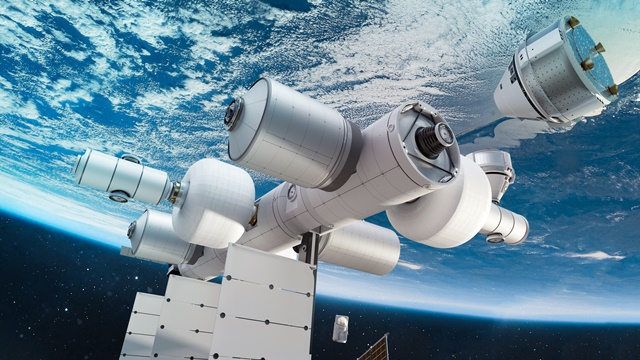26 Oct. 2021. A group of aerospace companies and university researchers revealed plans to build and deploy a commercial space station in low-earth orbit. The Orbital Reef station is a joint initiative led by launch craft company Blue Origin in Kent, Washington and space infrastructure developer Sierra Space in Broomfield, Colorado.
The Orbital Reef developers plan to provide a shared business park for companies seeking to exploit commercial opportunities in space. Joining Blue Origin and Sierra Space in the project are aerospace and space systems developers Boeing, Redwire Space, Genesis Engineering Solutions, and Arizona State University’s Interplanetary Initiative. Arizona State heads an academic advisory council of 14 universities in the U.S. and Europe. No timetable is given for deployment of Orbital Reef, other than after 2025.
Orbital Reef is expected to orbit 500 kilometers (311 miles) above the earth in an orbit diagonal to the equator and polar regions. Its designers say the station will support tenants developing products and technologies requiring zero-gravity or space-vacuum conditions, as well as space tourists. Orbital Reef is anticipated to accommodate up to 10 people in 830 cubic meters of volume, almost as much as the International Space Station.
Separate science and habitation zones
Blue Origin and Sierra Space are leading the project. Blue Origin, started by Amazon.com founder Jeff Bezos, is providing the reusable launch vehicles, while Sierra Space is offering its large habitation modules and DreamChaser space plane, a form of space shuttle, for transporting crews and cargo. Boeing is providing its Starliner crew space craft that can carry seven crew members, as well as a science module for the station. Redwire Space in Jacksonville, Florida is offering its expertise on microgravity and payload operations. Genesis Engineering Solutions in Lanham, Maryland is providing its single person spacecraft, a hybrid space suit and space craft for servicing Orbital Reef and external excursions.
Orbital Reef is expected to have separate science and habitation zones, which its developers say will be open for leasing to users and visitors from any nation. In addition to leasing room in the station, the Orbital Reef consortium says it plans to provide transportation, logistics, assistance with hardware development, and operations and servicing with robots and human crews. The consortium is also offering an incubator for commercial customers new to space-based enterprises.
“We will expand access, lower the cost, and provide all the services and amenities needed to normalize space flight,” says Blue Origin’s senior vice-president Brent Sherwood in a Sierra Space statement. “A vibrant business ecosystem will grow in low Earth orbit, generating new discoveries, new products, new entertainments, and global awareness.”
Arizona State’s Interplanetary Initiative leads a group of university researchers advising the project. “We’ve brought together an international group of more than a dozen universities,” says vice president of the Interplanetary Initiative Lindy Elkins-Tanton, “to work on the ethics and guidelines of research, on how we can bring to bear all our expertise in science and research and manufacturing in low gravity, to help nations, corporations and groups that want access to Orbital Reef.”
More from Science & Enterprise:
- Small Biz Award Funds Space Travel Refrigerator
- Space Mission Testing Sail to Return Launch Vehicles
- Retina Implant, Stem Cell Studies Set for Space Station
- Coffee, Hemp Cells Set for Space Station Study
- Infographic – More Low Orbit Satellites in Space
* * *


 RSS - Posts
RSS - Posts
You must be logged in to post a comment.